The 25 most memorable races of the last 25 years
Our highlights from each year since Cyclingnews' inception in 1995
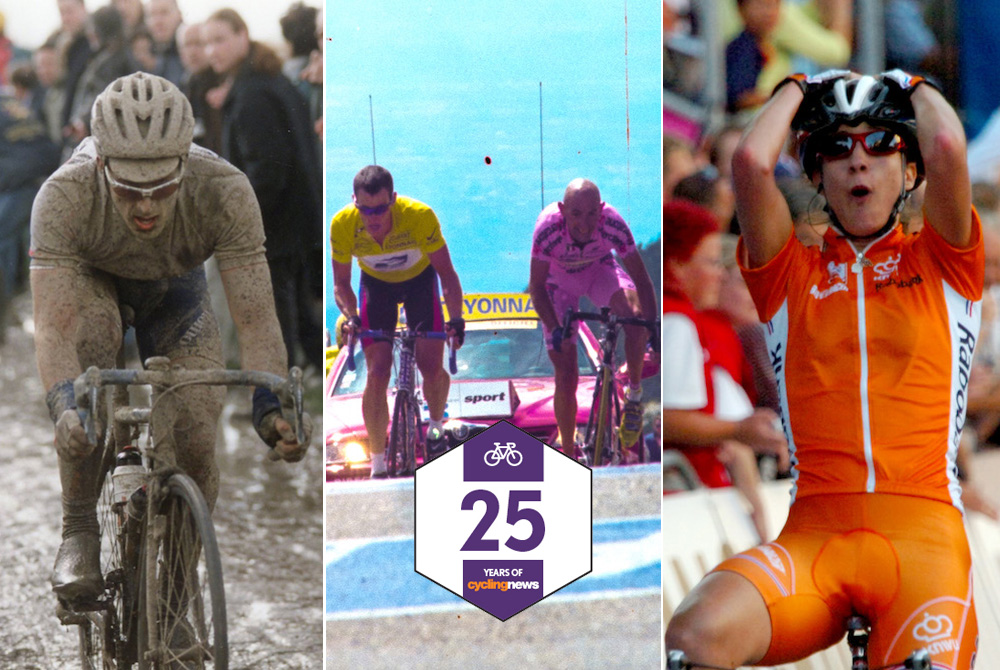
From Indurain and Luperini to Van der Poel and Van Vleuten, the past 25 years have served up more than their fair share of iconic moments, and today we're casting our eyes back over the best of the best.
With Cyclingnews turning 25 this year, we decided our series of celebratory features wouldn't be complete without a run-down of the best races of the past quarter of a century.
After facing the daunting task of ranking the top 25 races from thousands of possibilities, we decided we'd run through it year-by-year, picking the stand-out race from each of the past 25 seasons. We've included some honourable mentions and, as ever, our comments section is open for debate.
Our original idea for the piece was the 25 'best' races, but that seemed both vague and somewhat complicated, so we changed that to 'most memorable'. We've focused on the absolute height of sporting drama, but also given room for the context and characters that have made the following events so enduring.
2019: Amstel Gold Race – men
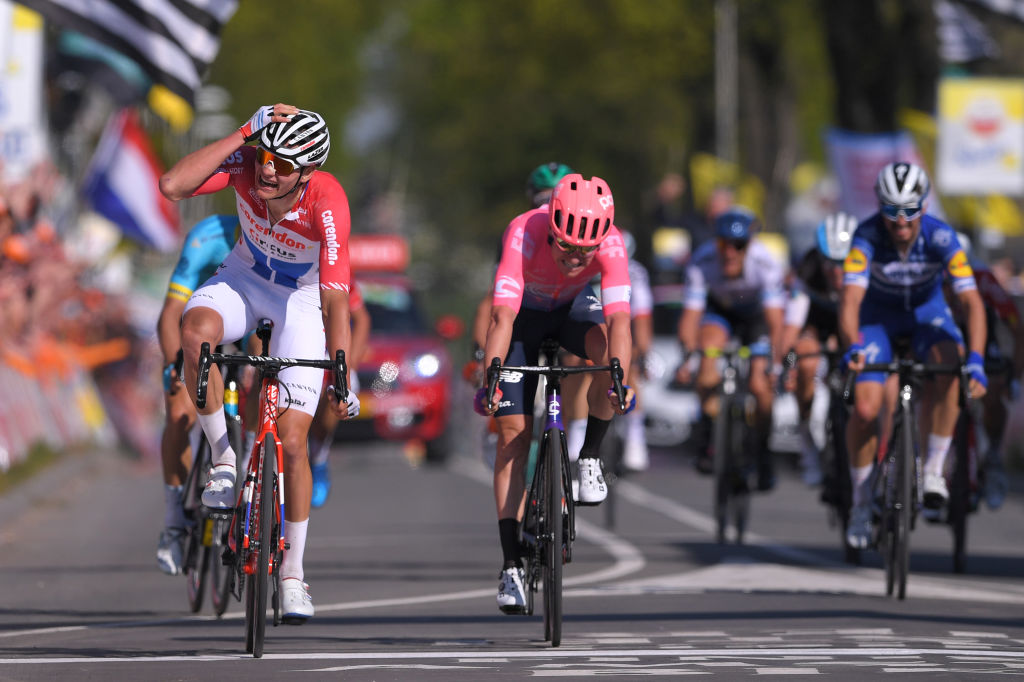
Mathieu van der Poel put his head in his hand and shook it in disbelief as he crossed the finish line, and his gesture spoke for everyone watching. The 2019 Amstel Gold Race was one of the most dumbfounding conclusions to a bike race we've seen in years.
Van der Poel and the rest of the field were dead and buried; Julian Alaphilippe and Jakob Fuglsang had long disappeared up the road, and were running us through a repeat of Strade Bianche. And yet somehow, somehow, Van der Poel stitched the race back together. You could sense the shock in the home straight when they turned around and saw the advancing Dutchman. By then, he had a line of riders on his wheel – who he'd swept up on the way past – and was snaking across the road, baring down with menace and pushing us to the very edge of our seats, if not out of them. He hadn't even made the catch when, somehow, he found another vicious turn of pace, breezing past Alaphilippe in the final 50 metres, making the Milan-San Remo champion look like was he was sprinting through treacle.
Beyond the mind-bending drama, this was the Dutch champion winning the country's biggest race, and the crowning glory of the then 24-year-old's debut Classics campaign. A star had arrived, and what an entrance. (PF)
The latest race content, interviews, features, reviews and expert buying guides, direct to your inbox!
- Honourable mentions: The Tour de France had it all, apart from a fitting crescendo, while Annemiek van Vleuten's 100km solo break to win the world title, if one-sided as a contest, will go down in history.
2018: La Course by Le Tour de France
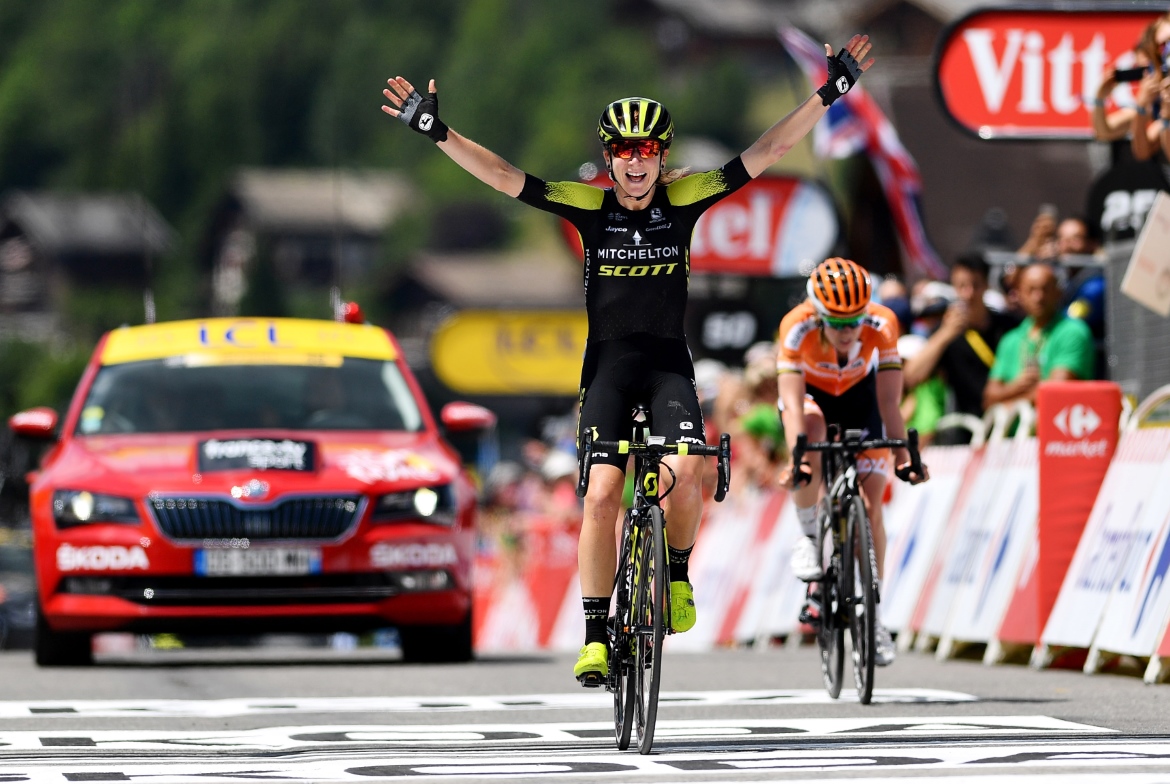
The 2018 edition of La Course by Le Tour de France was the most spectacular showdown of the year between the two biggest stars of the women's peloton: Annemiek van Vleuten and Anna van der Breggen.
The race was 112.5km routed through the mountains, over the Col de Romme and the Col de la Colombière between Annecy and Le Grand-Bornand. Many of the riders arrived at the start exhausted, having completed the Giro Rosa just two days before, including Van Vleuten, who had won the overall title in Italy.
A trio of Van Vleuten, Van der Breggen and Ashleigh Moolman-Pasio caught lone breakaway rider Cecilie Uttrup Ludwig near the top of the final climb – the Col de la Colombière – setting up a powerful attack from Van der Breggen. Only a slim 10 seconds separated her from a chasing Van Vleuten all the way down the winding descent towards the finish line.
Van der Breggen reached the banner signalling 200 metres to go, but faced one steep, final hill. She looked to struggle as Van Vleuten pushed with all her power to catch her compatriot inside the last 50 metres of the race, claiming the victory amidst the mass of spectators in Le Grand-Bornand.
It was a magnificent victory, and highly regarded as one of the best races of the 2018 season. (KF)
- Honourable mentions: The Giro d'Italia, with Simon Yates' fireworks and Chris Froome's astounding Finestre solo, was a race that'll be talked about for years to come. Vincenzo Nibali's Milan-San Remo victory was an instant classic and Strade Bianche was a wild, muddy ride.
2017: Giro d'Italia
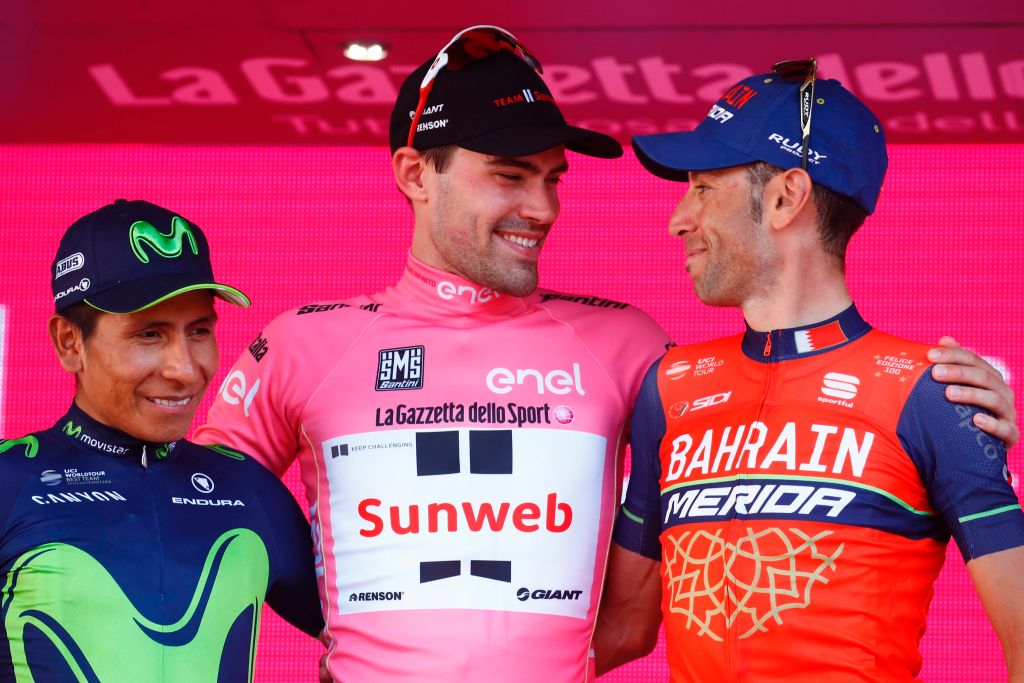
The Giro d'Italia has produced a remarkable sequence of editions over the past decade, but the 2017 race was arguably the pick of the bunch, hitting just about all the notes one anticipates from the corsa rosa in 23 dizzying days of action. There was tension, with four riders still in the hunt on the final day. There were polemics, with Tom Dumoulin and Vincenzo Nibali engaging in a war of words. There was absurdity in the form of Dumoulin's toilet stop on the Stelvio. There was drama, from the controversial crash at the foot of the Blockhaus to Nibali's daredevil descending, to Mikel Landa's sparkling final-week cameo.
Above all, there was a remarkable depth of quality, best illustrated by how Nibali 'only' finished third in what was one of the outstanding Grand Tour displays of his career. It was like cycling's answer to the Euro 2000 football tournament, with an array of potential winners all operating at something close to their very best, as Nibali, Dumoulin, pre-race favourite Nairo Quintana and Thibaut Pinot pushed one another all the way to Milan. The eventual winner Dumoulin forged his triumph in the Montefalco time trial, but adorned it with a series of assured displays in the mountains against such august opposition. (BR)
- Honourable mentions: Philippe Gilbert’s astonishing solo win at the Tour of Flanders. Michal Kwiatkowski beating Peter Sagan and Julian Alaphilippe to win Milan-San Remo. The final day of the Critérium du Dauphiné.
2016: Paris-Roubaix
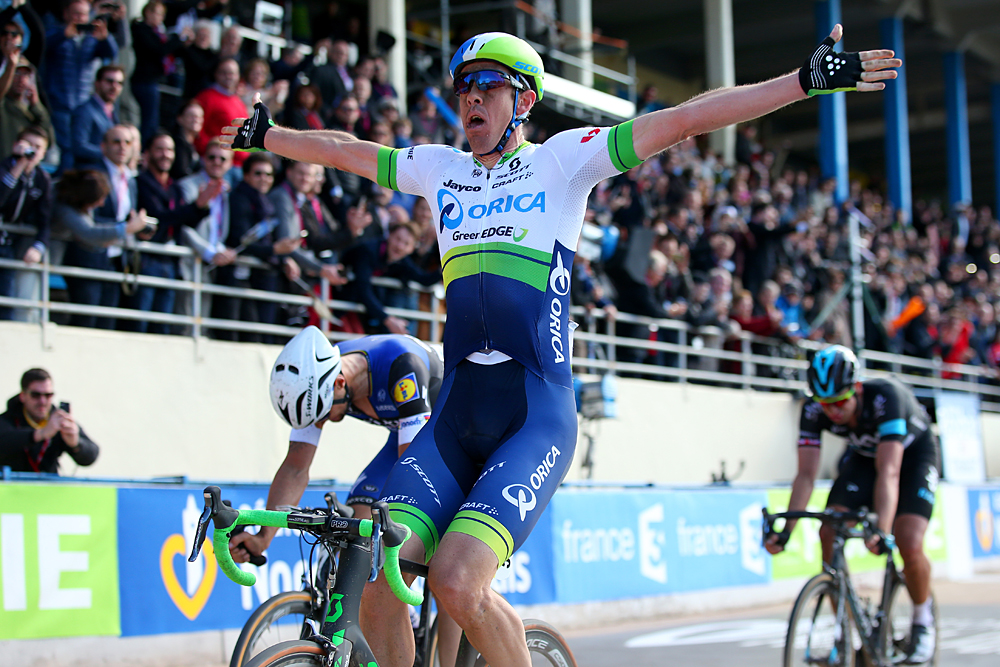
Mat Hayman was the embodiment of all the qualities needed to create the perfect domestique. Loyal, resilient, hard working and determined, he put aside any ambitions of his own relatively early in his career in order to serve others. So when he struck out on the Roubaix velodrome to win the biggest race of his entire career, the victory sent shockwaves through the sport.
Here was a rider near the end of his career who had no right to even be contesting the sprint for a Monument, let alone winning it. The fact that he was up against the four-time Roubaix winner in Tom Boonen, and beat the Belgian, made the moment even sweeter. Boonen, in his penultimate Paris-Roubaix appearance, looked set to claim a record-break fifth win as the escapees entered the velodrome, but instead the race ended with one of the most amazing upsets of all time.
A few years earlier, Hayman had missed the winning move by Johan Vansummeren due to poor tactics, and it looked as though the Australian would never have a better chance. Even the road to victory in 2016 was complicated by an injury that forced the GreenEdge rider to train indoors for most of March, but cycling has a way of providing upsets when you least expect them. Hayman's win was special because it proved that perseverance and determination could win through, even against the odds.
- Honourable mentions: Vincenzo Nibali's resurrection at the Giro d'Italia, via Steven Kruijswijk's Colle dell'Agnello crash, was stunning. Both Olympic road races were action-packed, and the women's Tour of Flanders produced a tense finale, as did Peter Sagan's solo win in the men's race.
2015: Gent-Wevelgem
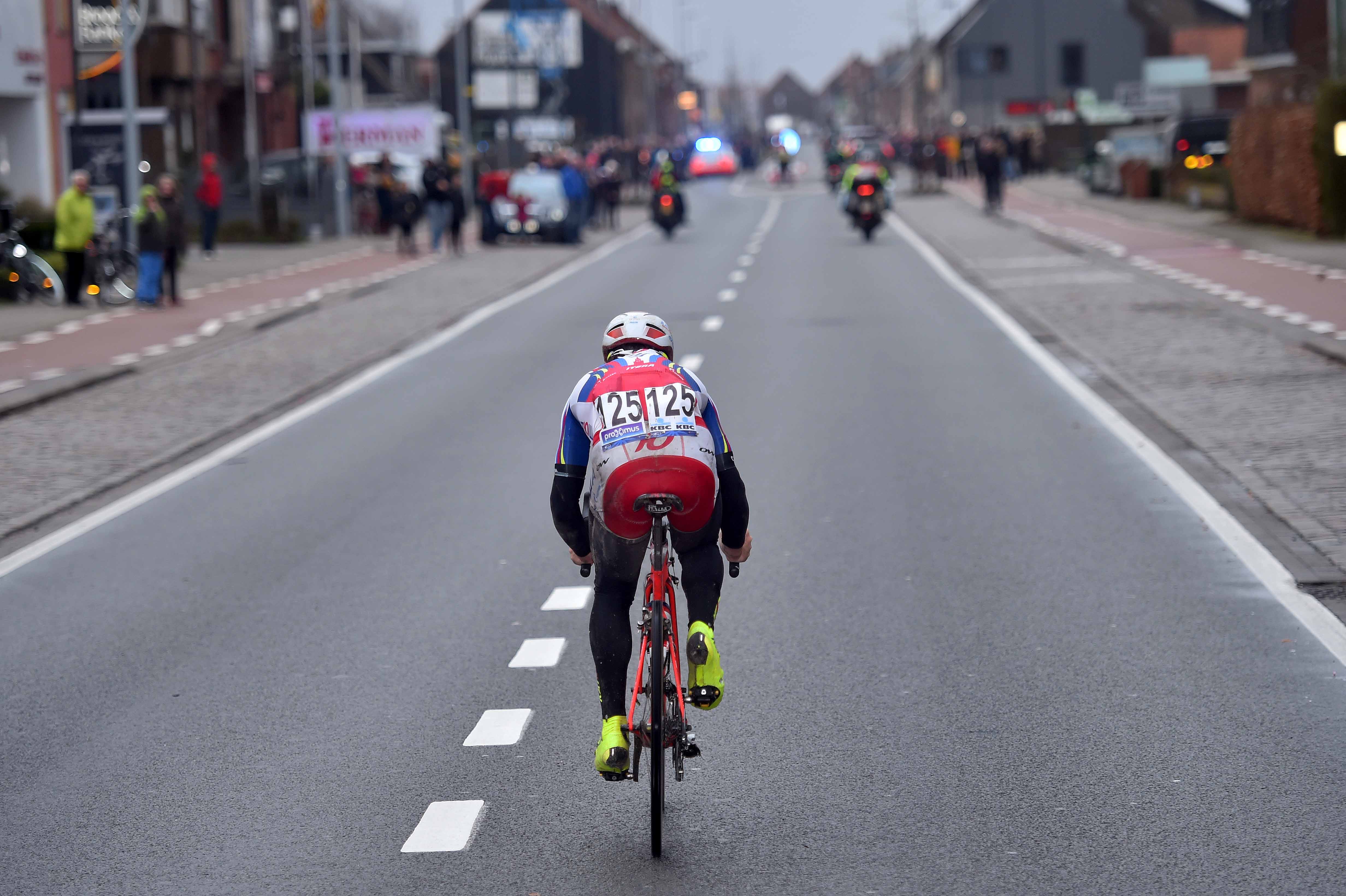
One of a number of races hit by brutal weather on our list, the 2015 Gent-Wevelgem saw Luca Paolini take the biggest win of his career having survived over six hours of carnage in the rain and horrendous crosswinds.
Only 39 men finished the 239km 'sprinter's Classic', which saw teams call for a race neutralisation at one point, riders blown from their bikes and more than half the peloton withdrawing before the halfway point.
Lotto's Jurgen Roelandts caught the eye with a 50km solo breakaway, eventually caught by an elite chase group at the 20km mark. Meanwhile, Paolini, having earlier struggled on the Kemmelberg, had saved his legs for the late race.
The Italian was driving the pace, making attacks, and whittling down the group, eventually jumping away alone – unchallenged – to ride the final 6km to victory alone. (DO)
- Honourable mentions: Ian Stannard's dismantling of a QuickStep trio at the Omloop Het Nieuwsblad, Alberto Contador's Giro victory over Astana's Fabio Aru and Mikel Landa, and both the elite road races at the Richmond Worlds.
2014: Tour de France – stage 5
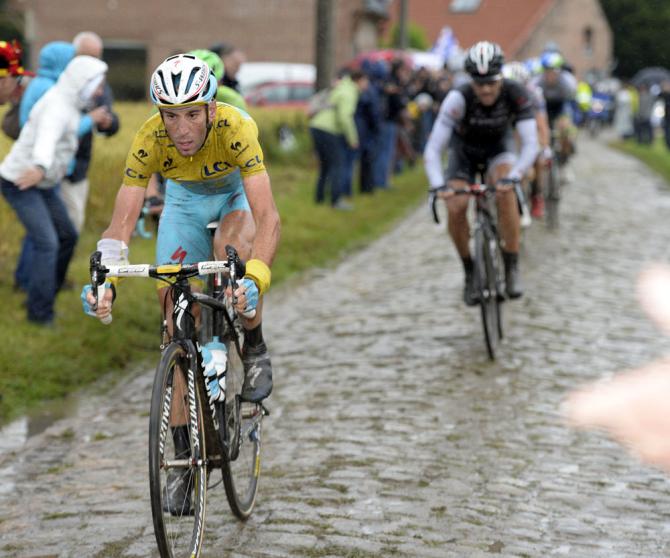
The Tour de France has always been a test for well-rounded riders, but when the 2014 Tour de France came upon the pavé for a rain-soaked stage from Ypres to Arenberg Porte du Hainaut, it pushed the riders' skill, equipment and mettle to such an extent, it left everyone wondering if such a difficult stage was even fair.
Although the race organisers cut two of the nine planned sectors of pavé, the greasy roads quickly slashed into the ranks of the general classification contenders: defending Tour champion Chris Froome crashed before the race reached the first cobbles and abandoned after a second crash. Andrew Talansky and Tejay van Garderen also crashed, and Alberto Contador lost time to a mechanical.
It was on the vicious four-star sector, the Carrefour de l'Arbre, that yellow jersey holder Vincenzo Nibali, dodging crashes and floating over the rough-hewn stones with the best of the Classics men, began carving minutes out on his rivals. Lars Boom won the day, but thanks to luck, skill, and great teamwork from Astana teammate Lieuwe Westra, Nibali made the race. The stage might have made the race less exciting in the end, but on the day it was a scintillating performance from the Italian. (LW)
- Honourable mentions: Quintana's Giro d'Italia victory via the Stelvio neutralisation chaos, Rabo-Liv's podium sweep at the Giro Rosa. A chaotic final weekend at the Critérium du Dauphiné which ended with Andrew Talansky's victory.
2013: UCI Road World Championships – elite men's road race
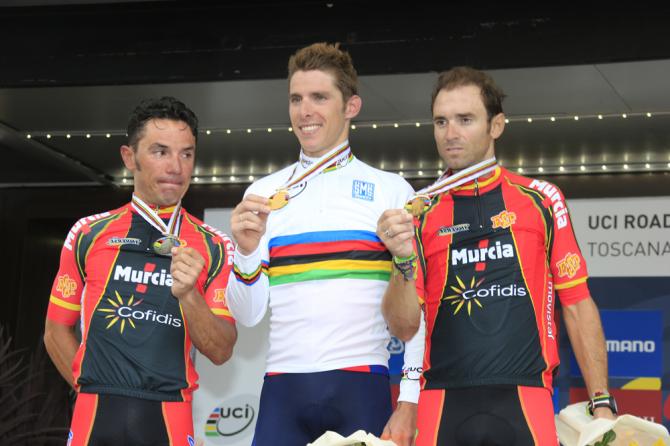
Finishes don't get much more exciting than at the World Championships road race in Florence, Italy, in 2013, when lone leader Joaquim Rodríguez of Spain was caught inside the last kilometre by Portugal's Rui Costa after seven hours of racing in torrential rain.
Rodriguez audaciously turned to Costa to give him some words of discouragement, but it was all bluster. It went down to the wire, but Costa had enough left to pip Rodriguez on the line.
"I was trying to make him nervous, but it was impossible, as he was confident in his own ability," Rodríguez said in the post-race press conference. "He was behind me, in a good position, and I was trying to get him to come through so that I was behind him."
Shortly after the finish, Rodriguez had already shown his disappointment, weeping on the podium, and voiced it, too, admitting that the situation had been "perfect for Spain" on the last lap, when he thought Spanish national teammate Valverde could have done more to make their numerical advantage count.
"I told Alejandro to go on the wheel of whoever chased after me," said Rodriguez. "When I saw Rui Costa come across alone, I didn't understand what had happened, but I knew I was riding for second."
For his part, Valverde said afterwards that he couldn't follow Costa's chase of Rodríguez, although he was perhaps more mindful of marking Italy's Vincenzo Nibali, who Valverde outsprinted on the line for third. The podium therefore consisted of two sheepish-looking Spaniards sandwiching the joyful rider from Portugul. (EB)
- Honourable mentions: The snowy, interrupted Milan-San Remo. Vincenzo Nibali's inventive defeat of Chris Froome at Tirreno-Adriatico.
2012: Vuelta a España
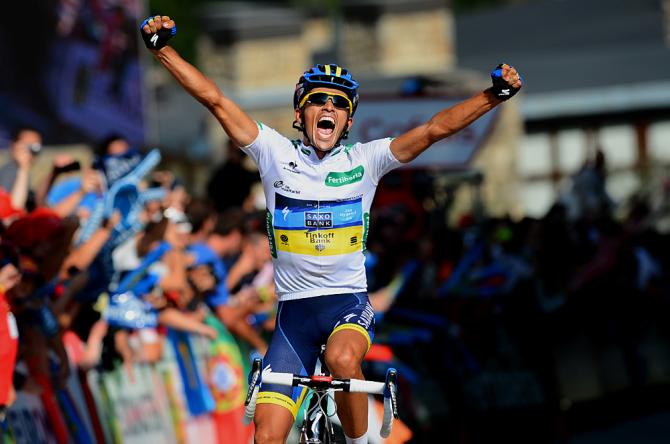
After two weeks of racing in the 2012 Vuelta a España, the overall classification looked all but settled. The race had been a ding-dong affair but, overall, by snatching handfuls of seconds here and there on steep uphill finishes, Joaquim Rodríguez looked set to finally take his first Grand Tour title. Chris Froome had started well but faded, due to exhaustion, in the third week, and Alejandro Valverde and Alberto Contador were never quite able to match Rodríguez on the climbs.
But then, in one of the most dramatic turnarounds in recent Grand Tour history, Contador went on the rampage on a seemingly unchallenging hilly stage at Fuente De, using his teammates and rivals in a series of brilliantly calculated collaborations to clamber into the overall lead with a solo stage win.
Coming in his first Grand Tour after his two-year suspension for doping, Fuente Dé showed Contador's ability to win a race when not the strongest physically – something he already demonstrated in the 2010 Tour (although he later lost the title anyway) – remained undiminished post-ban. But, most importantly of all, the 2012 Vuelta set Contador up as Sky's most unpredictable, charismatic and dangerous Grand Tour rival, all the way through to his retirement in 2017. (AF)
- Honourable mentions: Tom Boonen's third Tour of Flanders victory, Marianne Vos' Olympic title.
2011: Tour of Flanders
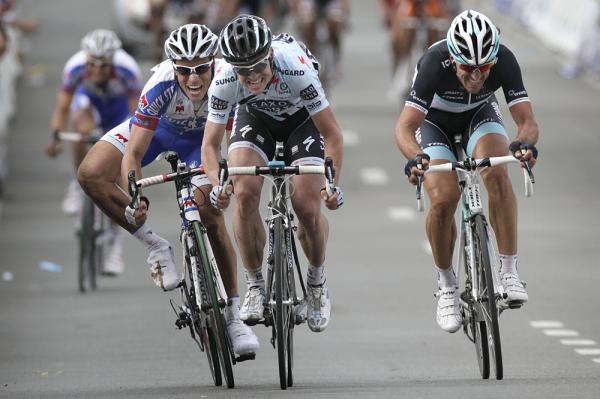
Fabian Cancellara's form in 2011 was ridiculously good, and by the time the Tour of Flanders rolled around, it wasn't a case of if he would win, but how much of a winning margin he would establish before the finish. His ride at the E3 Harelbeke a few weeks prior, when, despite a mechanical, he rode through every group on the road before winning solo, was one of the most dominant rides of his career.
However, sometimes brute strength doesn't come out on top, and sometimes it's the smartest rather that the strongest who wins.
The race had everything. After Cancellara's attack earlier on, it looked as though the win would be a forgone conclusion. But a missed bottle, a rallying ride from BMC Racing and a wonderful cameo from Sylvain Chavanel ensured that the race would at least remain a contest.
In the closing kilometres, Cancellara was still among the favourites, and looking strong, but when the winning move formed, it was Chavanel and Nick Nuyens who went with the Swiss rider before Nuyens won a nail-biting sprint finish. The win was a pure demonstration of how tactical acumen, patience and precision-timing could win out over power and strength. Nuyens had barely been at the front throughout the day until the winning move formed, making his victory even sweeter. (DB)
- Honourable mentions: The Tour de France featured Thomas Voeckler's stint in yellow, Alberto Contador’s ultimately unsuccessful bid to win at Alpe d’Huez, and Cadel Evans' last-minute toppling of Andy Schleck. Liège-Bastogne-Liège saw Philippe Gilbert complete the Ardennes triple by dispatching both Schlecks, and the Vuelta a España brought a ding-dong battle between surprise contenders Juan José Cobo and Chris Froome. Fabian Cancellara's astonishing exhibition at E3 Harelbeke.
2010: Kuurne-Brussel-Kuurne
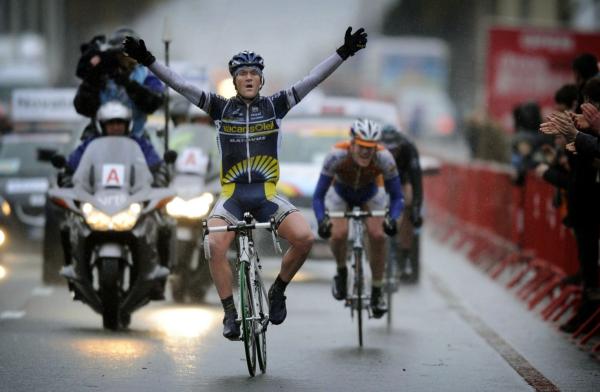
Had the UCI weather protocols been in place back in 2010, this race wouldn't have even started, with Storm Xynthia's 130km winds battering the peloton for the entirety of the 63rd edition of Kuurne-Brussel-Kuurne. The weather was so atrocious that only 26 out of 198 riders completed the race, with the high winds and freezing rain eliminating most of the peloton before the final move went clear.
Those that made it to the finish were clearly on a mission and determined to battle on, with Bobbie Traksel, Rick Flens and a young Ian Stannard forming the winning move. The race was nothing if not a war of attrition, with breaks and echelons a constant threat. Traksel went from miles out, first with teammate Vacansoleil Arnaud van Groen, before Stannard and Flens then made contact as the main favourites fell away. The site of Jeremy Hunt pulling out when fourth on the road was a reminder of just how brutal the conditions were.
Tactical know-how and finesse still proved to be crucial in the finale, with Traksel's class on show when he chased the right moves and ensured that both Stannard and Flens started the final sprint with little left in their legs. (DB)
- Honourable mentions: The Tour of Flanders saw Fabian Cancellara drop Tom Boonen like a stone on the Muur, while Mara Abbott claimed the USA's first Giro Rosa title, and Ivan Basso overhauled the surprisingly resilient David Arroyo to win the GIro d'Italia.
2009: Milan-San Remo
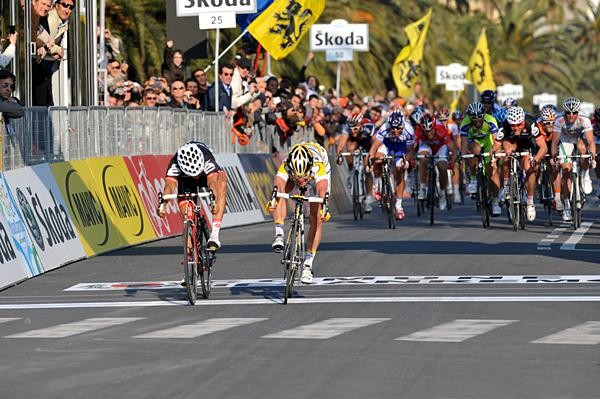
Like the 2019 Amstel Gold Race, the 2009 Milan San-Remo married edge-of-your-seat drama with the emergence of an icon. Mark Cavendish had already won four stages at the 2008 Tour de France but, as he put it, the Monument victory turned him from merely a 'great sprinter' into a 'great rider'.
Cavendish was often portrayed as brash and cocky, but he actively played down his chances for San Remo in a canny act of deceit, deliberately dropping back at Tirreno-Adriatico in the lead-up to the race in order to lead his rivals to believe he wouldn't survive the Cipressa and Poggio.
He did, and took the armchair seat with a kilometre to go as George Hincapie led out the reduced peloton, but a major spanner was thrown in the works when Heinrich Haussler catapulted off the front from some 300 metres out. You can see Cavendish clock it, and he leaves the field for dead as he sets off in pursuit. Haussler weaves right, then left, then right, before the ever-advancing Cavendish emerges and somehow finds an extra kick in the final 50 metres. Still, it doesn't seem enough, and the commentators all call it for Haussler, but Cavendish celebrates and the photo finish backs him up.
Heartbreak for Haussler, elation for cycling's new superstar, and a thriller for the annals of one of the sport's most venerated events. (PF)
- Honourable mentions: Philippe Gilbert’s thrilling Paris-Tours victory was the first in a fine sequence of Autumn wins. Paris-Nice had a dramatic finale after Alberto Contador's surprise setback on the penultimate day.
2008: Olympic Games – elite women's road race
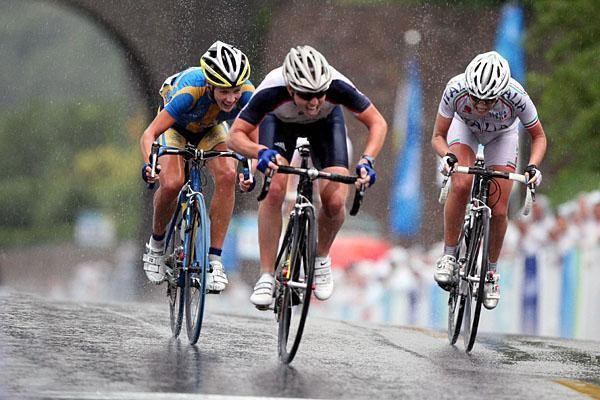
Nicole Cooke let out a deep guttural roar, punching the air and smashing her fists on her handlebars as she crossed the finish line to win the gold medal in a rain-soaked women's road race at the 2008 Beijing Olympic Games.
"I just came over the line and there was so much in me, so many emotions that all came out at once. I was not composed enough to take my hands off the handlebar, so much of it came out as noise because that's just the person I am," she said in a post-race interview.
Cooke started the 126.4km race as one of the favourites, with two dedicated Great Britain teammates in Emma Pooley and Sharon Laws. Cooke formed part of a five-rider group that broke away on the penultimate hilly finish circuit. The winning move was instigated by Tatiana Guderzo (Italy), and also included Emma Johansson (Sweden), Christiane Soeder (Austria) and Linda Villumsen (Denmark).
It was a suspenseful finale as Cooke unexpectedly lost contact with her rivals through the last corner with just 500 metres to go. The TV crew then switched cameras to instead pan across the finish line as fans waiting for the sprint to emerge over the hill. The riders soon came into view over the crest of the climb, spread wide across the road, with Cooke in the lead. She surged again and crossed the line a bike length ahead of Johansson and Guderzo to secure the gold medal for Great Britain. (KF)
- Honourable mentions: Philippe Gilbert’s 50km solo victory at Omloop Het Volk. Alberto Contador’s journey from the beach to Giro d'Italia victory. Carlos Sastre’s Tour de France-winning attack on l’Alpe-d’Huez.
2007: UCI Road World Championships – elite men's road race
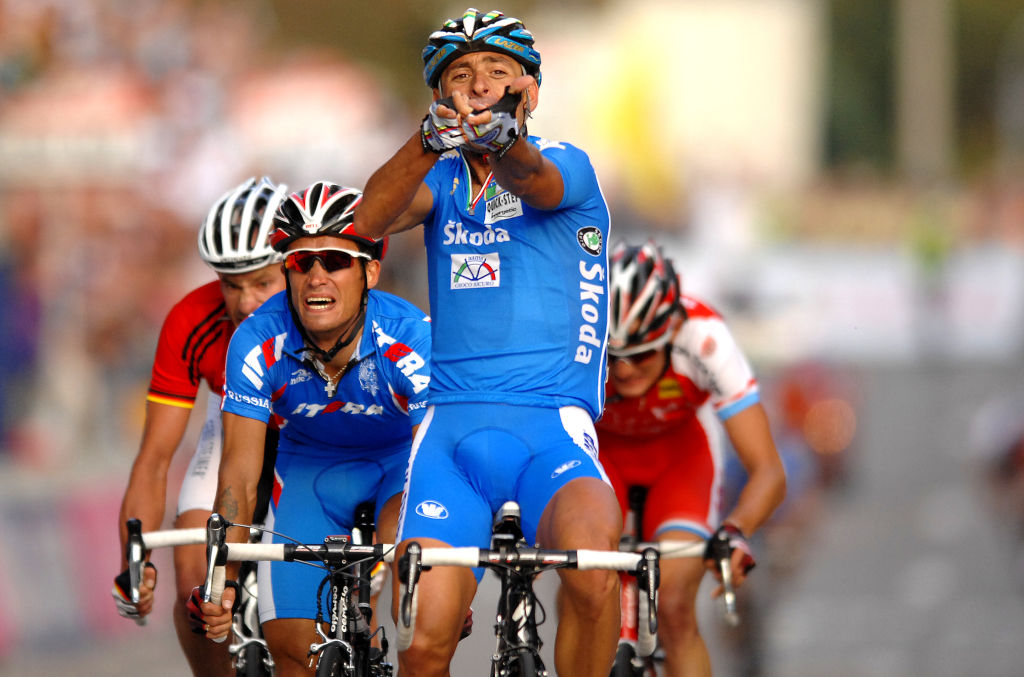
One of the more controversial World Championships in recent memory concluded with Paolo Bettini celebrating his victory in Stuttgart by shooting an imaginary gun as he crossed the line.
With Davide Rebellin, Filippo Pozzato, Damiano Cunego and Alessandro Ballan starting in Stuttgart, Italy enjoyed an embarrassment of riches in Stuttgart, but Bettini was the main man, though the reigning champion was close to being barred before the race.
Stuttgart's city council had brought a case to try to stop the 33-year-old from racing after he had refused to sign a UCI anti-doping pledge, calling the pledge, and the associated fine of a year's salary "extortion". The case was lost two days before the road race, however, and, as expected, Bettini and Italy took charge out on the road.
In the end, it was always going to be Bettini, the fastest finisher from the group of five that emerged in the closing kilometres of the 267km race.
"It was an instinctive gesture, not targeted at anyone," he said afterwards, at the end of a tortuous week.
"I had a lot of anger inside me and the only thing I could do was respond with a victory." (DO)
- Honourable mentions: Filippo Pozzato's victory from a high-quality break at Omloop Het Volk. Damiano Cunego's defeat of Riccardo Riccò at Il Lombardia.
2006: UCI Road World Championships – elite women's road race
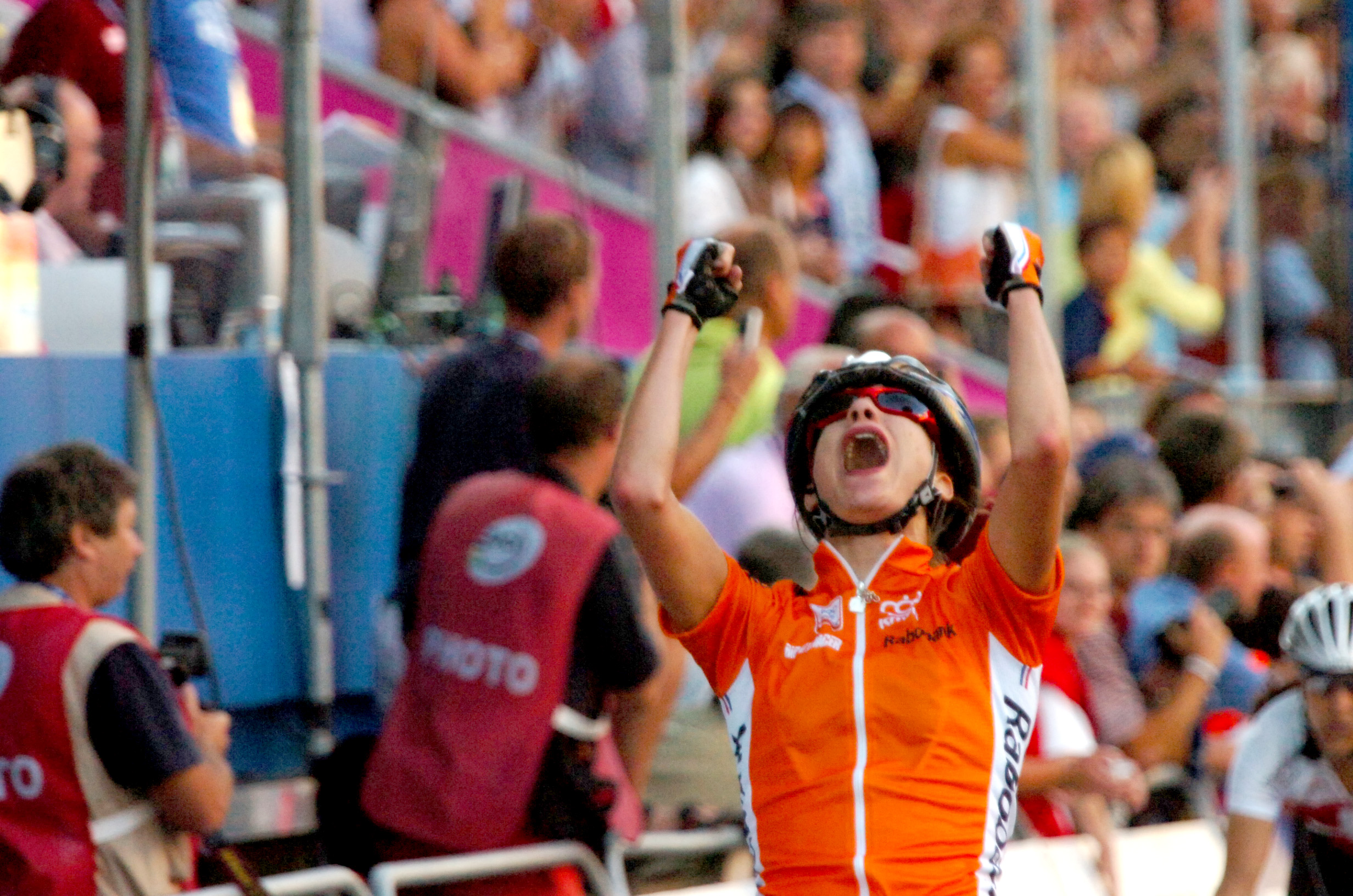
Marianne Vos' first elite women's road-race victory at the 2006 UCI World Championships in Salzburg, Austria, set the stage for a sparkling career that has spanned 14 years and 12 World Championship titles across three disciplines: road, cyclo-cross and track.
She had already won her first elite rainbow jersey in cyclo-cross earlier that year, but it was her road victory that proved to the world that she had made a smooth transition from junior to elite racing.
The women's 132.6km race blew up on the final two laps, with a lead group of 15 riders forming, which included high-profile Nicole Brändle (Switzerland), Nicole Cooke (Great Britain), Judith Arndt and Trixi Worrack (Germany), Noemi Cantele (Italy), Oenone Wood (Australia), Amber Neben (USA), Priska Doppmann and Annette Beutler (Switzerland), along with Dutch riders Chantal Beltman and the young Vos.
Brändle attacked twice over the last two climbs, bringing Vos and Cooke with her, but the small group came back together both times, and although there were a series of late-race attacks, nothing got away.
Italy led the field under the kilometre-to-go-banner, and when the sprint started, a 19-year-old Vos jumped from six wheels back and stormed up the left-hand side of the road into front and centre, crossing the finish line by an enormous margin over her veteran competitors.
"I was amazed that I was in the leading group, but I'm fast on the line, so it wasn't impossible to take the jersey. It wasn't easy, but the sprint was good, and to cross the line first was amazing," said Vos, who has gone on to become one of the most successful cyclists of all time. (KF)
- Honourable mention: Paolo Bettini winning Il Lombardia in the rainbow jersey days after the tragic death of his brother Sauro. The 2006 Tour de France was one of the most controversial in its history, and thus unforgettable.
2005: Giro d'Italia – stage 19
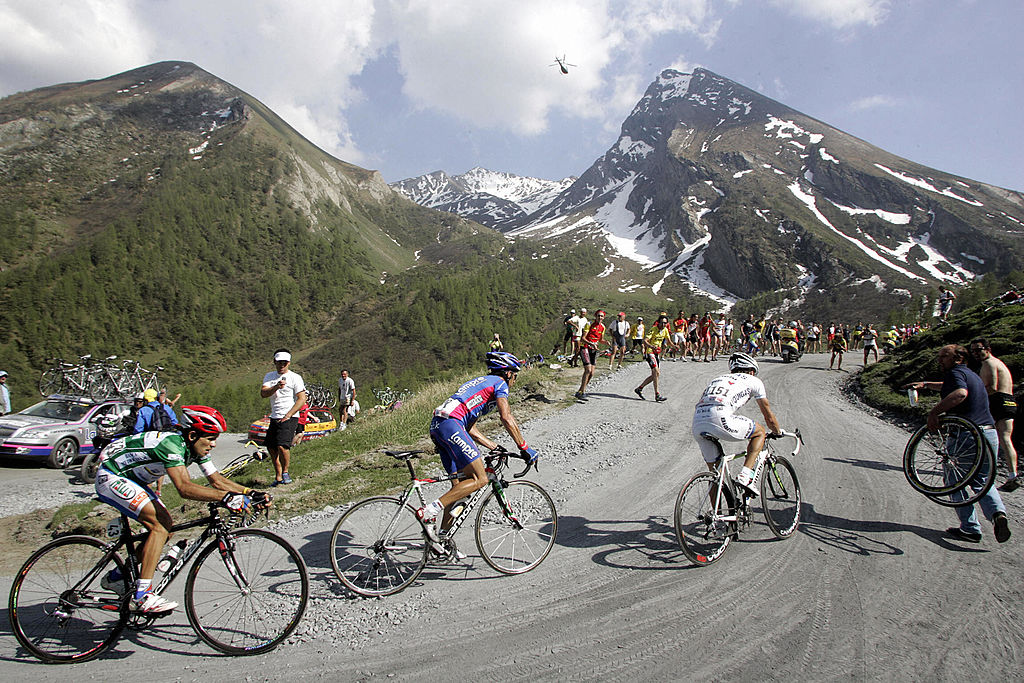
One stage springs to mind when you think of the 2005 Giro d'Italia, the penultimate day of racing from Savigliano to Sestriere. The steep, unpaved Colle delle Finestre was included for the first time, though with Paolo Savoldelli over two minutes up in the lead, it looked like one last obstacle en route to a second Giro victory.
The Italian, however, was in for the struggle of his life over the last 45km of the stage, stuck alone and two minutes adrift of the leaders at the halfway mark of the Finestre, with surprise contender José Rujano and two-time winner Gilberto Simoni riding away up the mountain.
By the top, Simoni was in virtual pink by 14 seconds, but Savoldelli still had one trick left to pull, with a narrow and twisting 9km descent lying in wait. He flew down the side of the mountain, picking up eight men along the way as Rujano and Simoni lost Danilo Di Luca to cramps.
Simoni himself suffered cramps on the final ascent to Sestriere, leaving Rujano to take a famous victory while Savoldelli had limited his loss to 1:41, securing overall victory.
"I knew it was possible to lose the jersey today," he said afterwards. "I wouldn't have been upset to lose the tour to a rider that was prepared to attack and risk everything.
"I don't feel like one of the great champions of the Giro, because the old champions used to attack on the climbs and make a big difference to the show. I'm more of a regular rider, and I have to calculate a lot, because I know what my limits are."
On stage 19, Savoldelli knew his limits, and exploited them perfectly to take the Giro title once again.
- Honourable mentions: Tom Boonen’s first Tour of Flanders victory was claimed with considerable élan. Nico Mattan's controversial duel with Juan Antonio Fleche at Gent-Wevelgem. Paolo Bettini's solo win at a rain-soaked Züri-Metzgete.
2004: Milan-San Remo
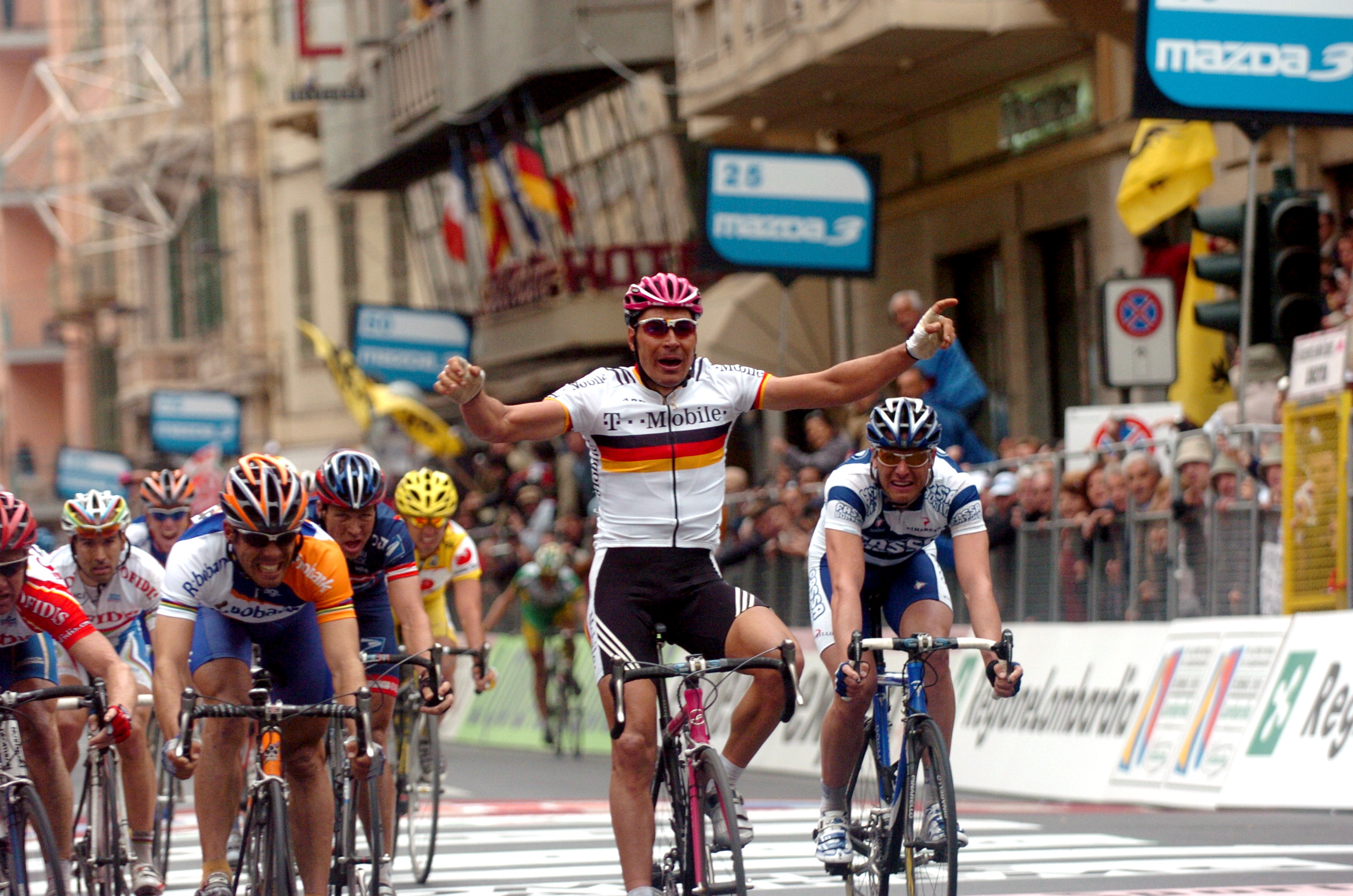
As premature celebrations go, this one – by German sprinter Erik Zabel – was one of the worst. This wasn't some local criterium; this was the 2004 Milan-San Remo – La Classicissima – although, luckily for him, Zabel had already won it four times before.
The enthusiastic Italian commentary that day crescendoed in the final few hundred metres as Alessandro Petacchi appeared to have been given the perfect lead-out by his Fassa Bortolo teammates – only for Zabel, clad in the German road race champion's jersey rather than his T-Mobile team's lurid pink, to pop off the back of the Italian sprinter's wheel with under 100 metres to go, after which it was clear that it was going to be a two-horse race between the German and Spain's Oscar Freire (Rabobank).
Freire drew alongside Zabel, and the two homed in on the finish line – only for Zabel to inexplicably sit up before the line to begin his celebration, throwing away all his good work in one fell swoop. It was a rookie mistake from a far-from-rookie rider, while Australia's Stuart O'Grady (Cofidis) sneaked through to take third place from a tired, dejected Petacchi.
Freire would go on to win Milan-San Remo twice more, in 2007 and 2010, while Zabel would never win again, and so missed out on moving up to a clear third place on the all-time list of race winners – a spot he currently shares with fellow four-time champion Gino Bartali of Italy, behind Belgium's Eddy Merckx with his seven victories and six-time winner Costante Girardengo of Italy.
And Petacchi? The Italian sprinter only had to wait another 12 months to bag his first, and only, Milan-San Remo victory. (EB)
- Honourable mention: The unusual 'individual team time trial' to the top of Mont Faron for the final stage of the Tour Méditerranéen should have received more plaudits and coverage, but was overshadowed by Marco Pantani’s death the day before.
2003: Tour de France
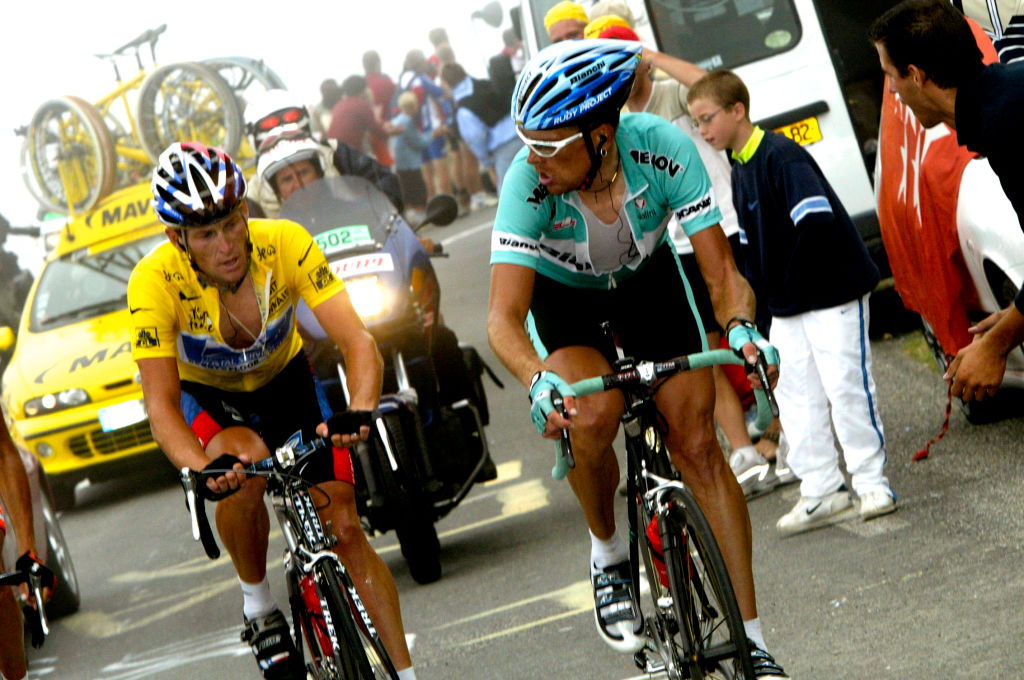
All cycling fans want is a combination of excitement and entertainment, and when it comes to the Tour de France, anticipation often reaches fever pitch as the best in the world arrive at the Grand Départ with dreams of competing for the most fabled jersey in the sport.
So when the domination of one rider sets in over a long period, that thrill and build-up dissipates. That was exactly the atmosphere ahead of the 2003 edition of the race, when the overwhelming favourite, Lance Armstrong, arrived in Paris seeking a fifth and record-equalling win. However, over three weeks in July, the American was made to look human for the first time since 1999, his walls of invincibility chipped away by an opposition that had grown weary and finally raised their game.
The assault on Armstrong's throne began at Alpe d’Huez, with Iban Mayo, Tyler Hamilton and Joseba Beloki taking turns to unsettle the American. The Spaniard's crash into Gap, however, provided one of the most unforgettable moments in Tour history, but his departure paved the way for Jan Ullrich to mount his first serious Tour challenge since 1997.
The German, who has riding free from the shackles at T-Mobile, was sick and almost quit during the first week, but his renaissance display in the blistering heat of the 47km time trial to Cap'Découverte gave Armstrong his first kicking in years. For the first time since 1999, fans had hope. The German took more time the next day, but by Luz Ardiden, the maillot jaune was sitting a little more comfortably on Armstrong's shoulders, despite a coming together with a fan on the side of the road.
Ullrich's decision to attack before the final climb that day, and instead go clear on the Tourmalet when Armstrong still had so many teammates, remains one of Ullrich's most inexplicable tactical blunders, and by the final time trial in Nantes, the race was over. Ullrich would eventually have to settle for second place after a crash in the rain, but, for the first time in five years, fans had a Tour that kept them gripped and on the edge of their seats. (DB)
- Honourable mention: The 2003 Vuelta a España was also a classic, with Roberto Heras fighting relative unknown Isidro Nozal. Meanwhile, the 2003 Tour of Flanders saw Frank Vandenbroucke briefly put his troubles behind him to battle Peter Van Petegem for victory.
2002: UCI Road World Championships – elite men's road race
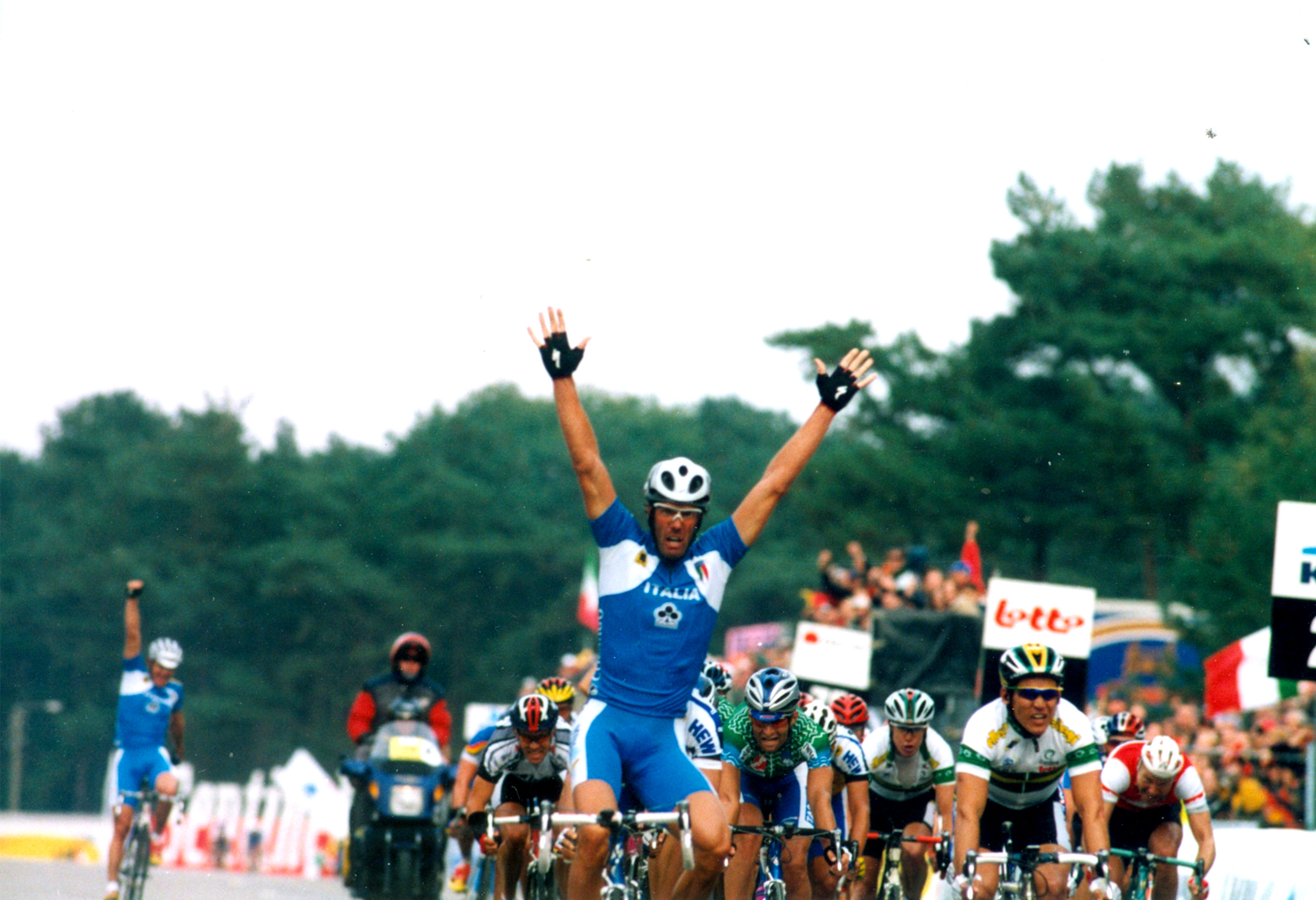
The race itself, played out on a Belgian motor-racing circuit on a damp, grey Sunday that could have been lifted from a Jacques Brel song, was hardly much of a spectacle, but the context was fascinating. Mario Cipollini had enjoyed a remarkable renaissance to put together a career-year in 2002, winning Milan-San Remo on his 35th birthday, as well as Gent-Wevelgem, six stages of the Giro and three more at the Vuelta. After his Acqua e Sapone team was overlooked for the Tour, Cipollini had briefly retired from cycling to devote himself full-time to attention-seeking, but he returned to lead the squadra azzurra in Zolder.
A strong Italian team was able to rely on the kindness of assorted strangers to help control the peloton all day. A bunch sprint was effectively preordained, and when Spain's Oscar Freire, perhaps the one man capable of tearing up the script, crashed on the last lap, the result was inevitable.
Cipollini was scarcely 10 pedal strokes into his sprint when Paolo Bettini and lead-out man Giovanni Lombardi began to raise their arms in celebration. An exhibition. It was the crowning moment of Cipollini's career, but the triumph was tainted a decade later when La Gazzetta dello Sport outlined the grim nature of Dr. Eufemiano Fuentes' contribution to his annus mirabilis. The self-styled Lion King, as ever, vehemently denied all wrongdoing. (BR)
- Honourable mention: 'Honourable' may not be the word for a scandal-filled 2002 Giro that was variously mad, bad and dangerous to know – but it was certainly memorable.
2001: Paris-Roubaix
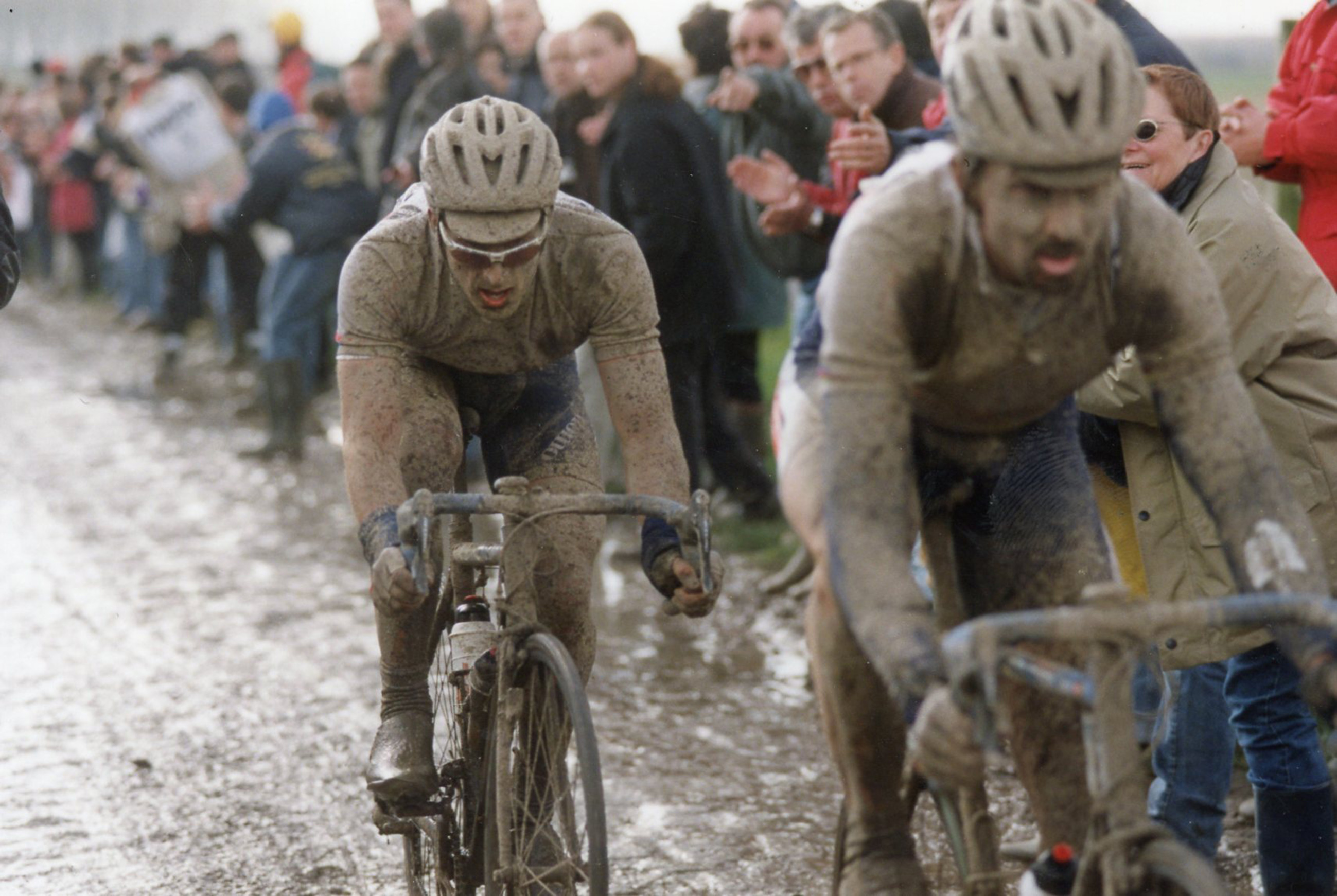
The lack of rain at Paris-Roubaix over the past 18 years has only made the image of a mud-caked Servais Knaven soloing across the line in the Roubaix velodrome more enduring. The 2002 edition was in fact the last wet Roubaix, but the conditions in 2001 were something else, and the race itself was far more gripping.
Johan Museeuw, who would win at a canter in 2002, and who'd come back from a career-threatening injury to win in 2000, was the pre-race favourite and Domo-Farm Frites' leading light. And yet it was the unsung Knaven who walked away with the cobblestone trophy at the end of a race that was blown to pieces inside the first 100km.
Wilfried Peeters embarked on a 70km solo mission, Museeuw punctured five times, and yet both ended up in the final selection as Domo put four riders in the group of eight. Still, when Knaven, usually a support rider, slipped away, he was never seen again, with Museeuw and Latvia's Romans Vainsteins mopping up in the velodrome to make it a Domo podium sweep.
This was the first season for Patrick Lefevere's team following the split with Mapei, who were familiar with podium sweeps but had controversially 'chosen' Museeuw as the winner in 1996. The 2001 Roubaix showed Lefevere prized the collective over the individual, and the same numbers game is still played by his Deceuninck-QuickStep team. (PF)
- Honourable mentions: The Vuelta a España had a gripping denouement. Richard Virenque’s solo win at Paris-Tours. Christophe Moreau's narrow win over Pavel Tonkov at the Critérium du Dauphiné.
2000: Tour de France – stage 12
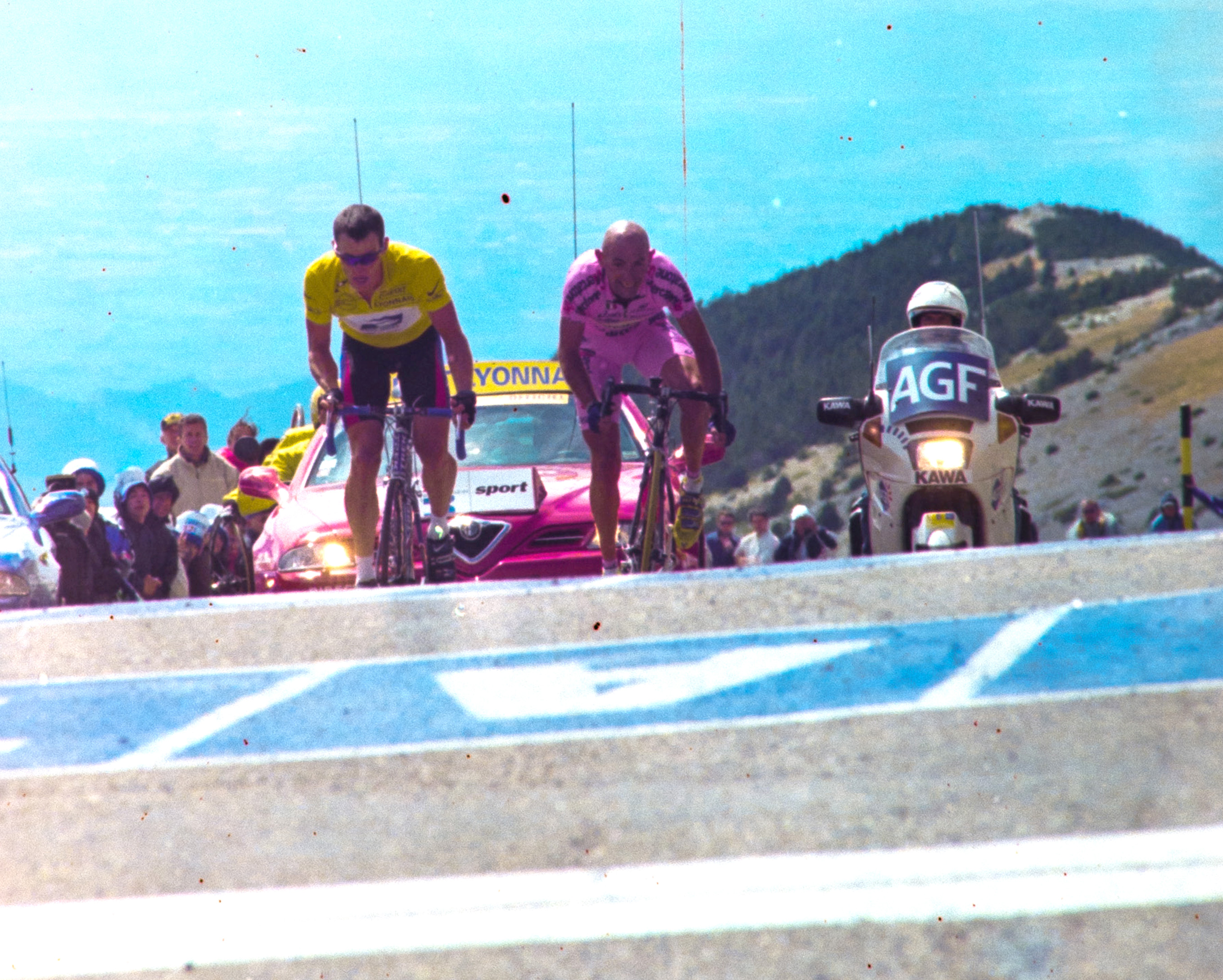
In 2000, Lance Armstrong was still an upstart one-time Grand Tour winner and, while Marco Pantani's star had begun to wane following his expulsion from the Giro d'Italia the previous year, he still had a rock star's following, a punch in his pedal-stroke, and a chip on his shoulder.
Pantani quickly fell out of overall contention after losing ground on the first summit finish at Hautacam, so when it came to Mont Ventoux two days later, he had a point to prove.
He might have been tailed off on the lower slopes, but Pantani never once let off the gas, clawed his way back on to Armstrong's lead group, and launched attack after attack until he finally isolated Armstrong.
Pantani sprinted to the stage victory by a wheel but Armstrong insulted him by insinuating he'd gifted the Italian the win, setting off days' worth of drama in the press. Pantani won stage 15 in Courchevel, and, vowing continued revenge, attacked Armstrong on stage 16 to Morzine with 120km to go, only to drop out due to stomach problems the next day. (LW)
- Honourable mentions: Johan Museeuw's 'knee celebration', upon winning Paris-Roubaix after a career-threatening injury, was iconic. His rival Andrei Tchmil claimed a notable solo victory at the Tour of Flanders the previous week.
1999: Vuelta a España
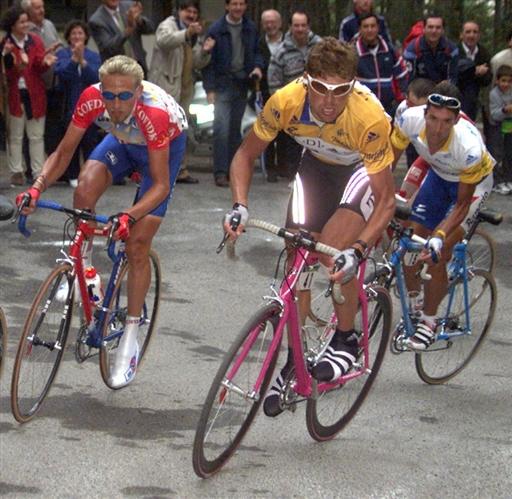
The 1999 Vuelta a España was the race of a hundred plotlines, but the biggest news long-term was the revival of Jan Ullrich. Absent from that year's Tour because of a knee injury, winning the 1999 Vuelta gave Ullrich renewed confidence to take on Lance Armstrong in the Julys to come.
His battle to take the Vuelta was an intriguing one, too, starting with a gutsy, utterly unexpected, stage win in the mountains of western Spain, then taking the lead in Andorra. Under pressure in the final week from Banesto, Ullrich responded with a crushing final time-trial victory.
But there was so much more to the 1999 Vuelta: the spectacular defeat of ONCE, losing both leaders Laurent Jalabert and Abraham Olano in the same day; the stunning brace of stage wins for Frank Vandenbroucke; the emergence of Roberto Laiseka and Euskaltel-Euskadi with a brilliant debut mountain-top win at Abantos; the riders' go-slow in the farcical, rainsoaked stage in Barcelona; the terrible crash for Fernando Escartin just before the first-ever ascent of the Angliru and Jose Mariá Jimenez's win, swooping past Pavel Tonkov, in the mist; and, last but not least, the first-ever Vuelta podium finish for Roberto Heras – who would dominate the race for the next six years. (AF)
- Honourable mention: Vandenbroucke's Liège-Bastogne-Liège victory earlier in the year, while the Belgian was also part of a three-way battle for victory at Flanders with Peter Van Petegem and Johan Museeuw. Oscar Freire's canny win at the Worlds came at the end of a tumultuous race where Vandenbroucke – who else? – was again to the fore, despite injuring both wrists in a crash.
1998: Tour de France
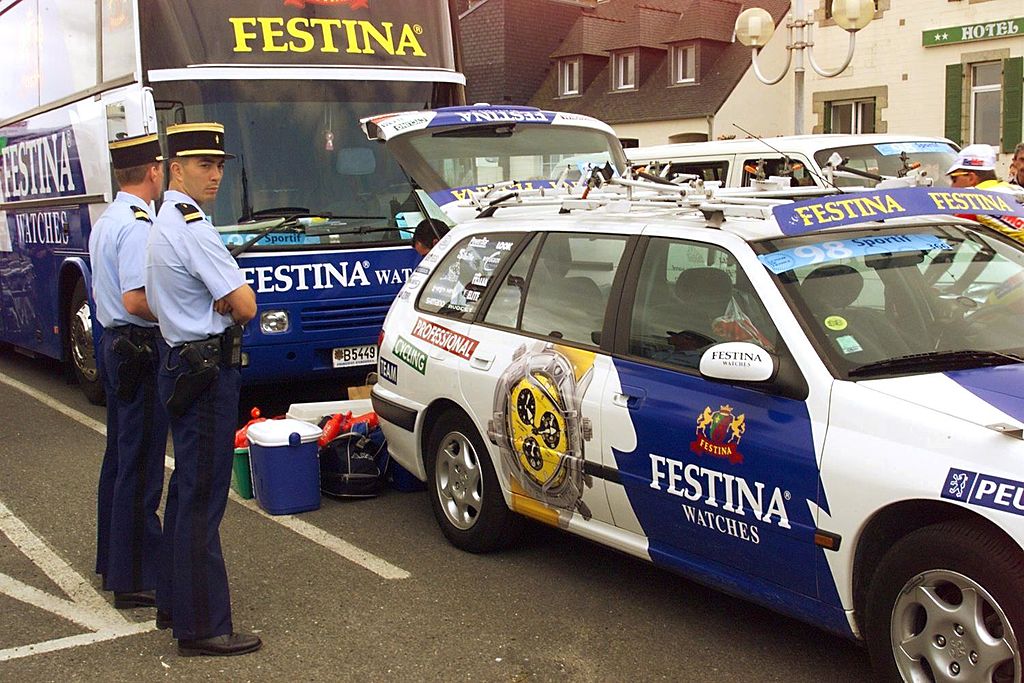
Memorable, mainly, for all the wrong reasons, the 1998 Tour de France was a watershed moment for the sport as it became abundantly clear just how bad the cycling's doping problem had become.
Ireland hosted the Grand Départ, but it was overshadowed by the arrest of Festina team soigneur Willy Voet, three days before the start of the race, after he was caught with a carload full of drugs destined for his team's riders.
After the muddled, messy first week emerged 'Il Pirata' – that year's Giro d'Italia champion, Marco Pantani – who climbed his way through the Pyrenees and the Alps at the head of affairs, the Italian's hands stylishly gripping the drops of his handlebars as he did so.
Pantani became a huge star – at first credited with having saved the Tour. Not even six years later, however, on Valentine's Day 2004, he'd be found dead in a Rimini hotel room – the victim of a cocaine overdose following a sad descent into depression due to a dangerous combination of fame and drug use.
There's therefore not much great to really remember the 1998 Tour de France for; just that it was a key year in professional cycling's history, and a turning point, of sorts – and also a sad reminder of Pantani's best year. (EB)
- Honourable mentions: Pantani's Giro glory. Michele Bartoli's second-straight Liège victory. The in-house but very public José Maria Jimenez-Abraham Olano duel at the Vuelta.
1997: Liège-Bastogne-Liège – men
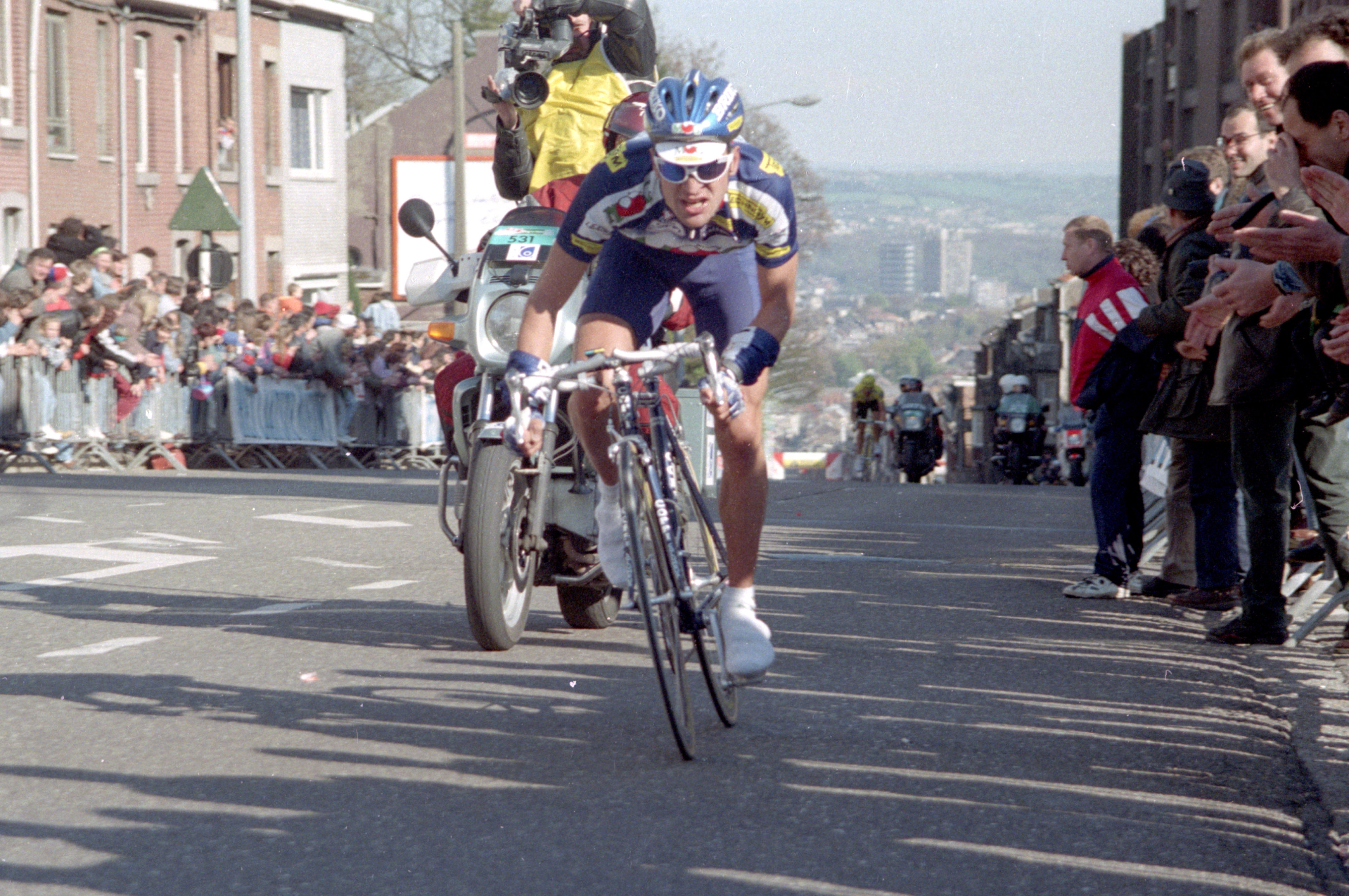
When handlebar extensions were first introduced to the peloton in the mid-1990s, they seemed like garish accoutrements – witness the unsightly upright angle on early-adopter Claudio Chiappucci's Spinaci bars – but Michele Bartoli could make anything look elegant. He was tucked tastefully on his extensions as he sped towards Liège in the company of ONCE duo Laurent Jalabert and Alex Zülle, then the world number one and two, respectively. MG-Technogym directeur sportif Giancarolo Ferretti's instructions were simple: "Work as hard as them, but no harder."
They had forged clear in a slugging match on the Côte de la Redoute, but Bartoli deftly parried their blows on the Sprimont and Forges in the finale, and a punch-drunk Zülle sat up as they made their way through Liège. One down.
As the gradient stiffened towards the finish at Ans, Bartoli hit the front, Jalabert on his wheel. With one arm on the bars, the Tuscan took a long, almost nonchalant look back to scan for sight of the chasers, who included Marco Pantani and Johan Museeuw. Then, beneath the flamme rouge, Bartoli turned to the task in hand, burning Jalabert off his wheel with an acceleration that was as smooth as it was overwhelming.
It was something akin to Cancellara v Boonen on the Muur in 2010, but turning a monstrous gear on a steep incline never looked quite as stylish as this. (BR)
- Honourable mentions: Frédéric Guesdon’s surprise Paris-Roubaix win. Jalabert and Bartoli’s day as allies of circumstance at the Tour of Lombardy as the Italian sealed the World Cup. Jan Ullrich’s dominant Tour de France victory.
1996: Chris Boardman's Hour Record
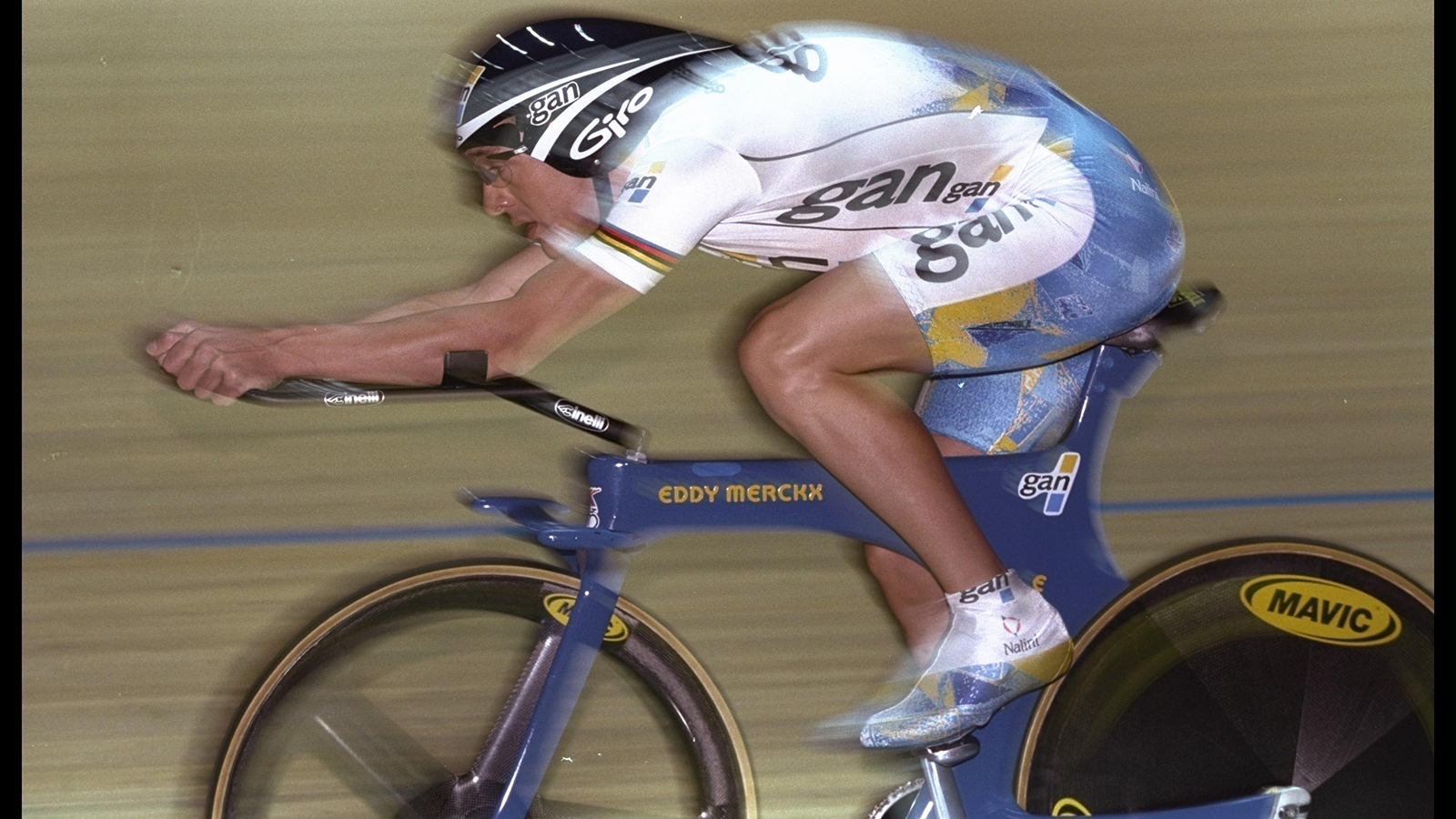
The 1990s were a decade of experimentation for cycling as new technology and materials allowed builders to twist the traditional two-triangle bicycle into unrecognisable shapes.
Francesco Moser, Graeme Obree, Miguel Indurain and Tony Rominger crouched into impossible positions, using disc wheels, skinsuits and special helmets to progress the Hour Record from Eddy Merckx's 49.431km to over 55km in the decade.
Boardman's 1996 mark set at sea level in the Manchester Velodrome atop the Lotus 110 – 56.375km – was such a huge leap from Rominger's previous mark of 55.291km that it shocked even his coach, Peter Keen. It still stands today as the 'best human effort' for the Hour – the UCI's term a massive understatement for Boardman's accomplishment.
"This is my personal limit," Boardman said afterwards. "I don't want to ever do it again, and these figures will make other contenders think twice."
When the UCI changed the rules in 1997, Boardman got on a Merckx-style machine and set another record, going just 10 metres further than 'The Cannibal'. After that, the Hour Record faded in popularity until the UCI revised its rules in 2014, but Victor Campenaerts' record, 55.089km, is still more than a full kilometre behind Boardman's 1996 mark. (LW)
- Honourable mention: Bjarne Riis' ending of the Indurain empire at the Tour de France. Indurain's own all-action victory at the Dauphiné the previous month. Mapei's controversial 1-2-3 at Paris-Roubaix.
1995: Tour Cycliste Féminin
A 21-year-old Italian, Fabiana Luperini, burst onto the women's circuit in 1995, and although she had won the Trofeo Alfredo Binda the year before, this was the year that she became one of the most accomplished climbers in the history of the sport after winning both the Giro d'Italia Femminile and the Tour Cycliste Féminin.
The original Tour de France Féminin, from 1984-1989, spanned three weeks and just over 1,000km. By 1992, it had transitioned into the Tour Cycliste Féminin, and although it was reduced to two weeks, it maintained upwards of 1,300km, meaning the stages became longer, and included some of the iconic climbs used in the men's Tour de France.
The 1995 edition of the race was a rare mountainous edition, and Luperini remembers racing up the Madeleine, the Glandon and the Tourmalet, and it reportedly also included Alpe d'Huez. What also made the race a spectacle was the expected showdown between the up-and-coming Luperini and the veteran Jeannie Longo on her home grounds. In the end, it wasn't quite the contest everyone had envisioned because Luperini put eight minutes into Longo on the Madeleine stage, and subsequently won her first overall title at the Tour Cycliste Féminin.
"Longo was very strong in the time trial, but I was able to create big gaps on the climbs," Luperini recalled. "I also had a very strong team with [Roberta] Bonanomi and [Alessandra] Cappellotto. The stages were long, but there were also long transfers by car. The race was two weeks, with one day off. It was very hard." (KF)
- Honourable mentions: Abraham Olano's victory in the men’s road race at the World Championships, ahead of Spanish teammate Miguel Indurain and Italy's Marco Pantani, on a brutal Colombian course. ONCE's mass attack on the road to Mende at the Tour de France.

Dani Ostanek is Senior News Writer at Cyclingnews, having joined in 2017 as a freelance contributor and later being hired full-time. Before joining the team, she had written for numerous major publications in the cycling world, including CyclingWeekly and Rouleur. She writes and edits at Cyclingnews as well as running newsletter, social media, and how to watch campaigns.